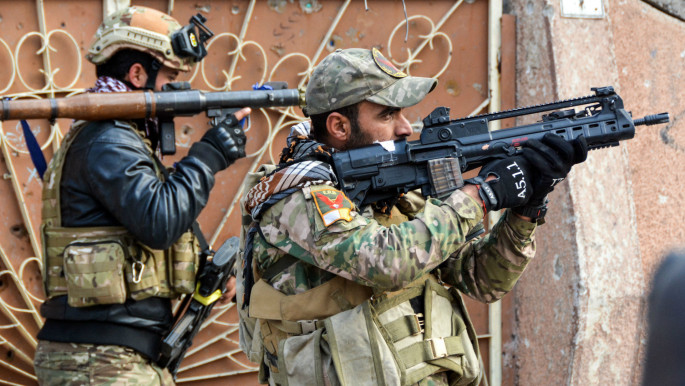
IS religious police fired for 'drinking alcohol, visiting prostitutes'
The abandoned paperwork found in the flashpoint Iraqi city of Mosul details reasons for dismissals among IS' Islamic Police known as the Hisba, Iranian news network al-Alam reported on Wednesday.
"Charge: molesting one of the young brothers," reads one document, signed on 26 July 2014 just a month after the extremists overran the city.
Another document lists the reason for dismissal as "complaints about alcohol drinking and frequenting whore houses".
One policeman was fired because of "suspicions he followed Shia Islam, hanging out with girls and bad manners" – IS militants consider Shias to be heretics.
Another cop was given the axe because he was caught "sexually harassing women in the marketplace while dressed in an Islamic police uniform".
 |
|
| Tens of thousands of Iraqi fighters are fighting to take back Mosul from IS [Getty] |
The New Arab could not independently verify the content of the documents.
IS' "morality police" have imposed a hard-line Sunni interpretation of Islamic behaviour in areas under the group's control. The force checks the length of men's beards and enforces bans on smoking as well as Western-style dress.
In 2015, photos emerged of a metal cage placed in a square in IS' de facto Syrian capital of Raqqa. Residents were reportedly held in the public jail cell for up to 24 hours for violations such as wearing jeans, smoking cigarettes or being late for prayers.
On Wednesday, Iraq's military said government troops were in "full control" of the entire eastern side of Mosul after expelling IS militants, three months after an offensive was launched against the extremist bastion.
Staff General Talib al-Sheghati told reporters that the left bank of the Tigris River that divides the city had been "liberated".
The offensive, Iraq's largest military operation in years with tens of thousands of fighters involved, began with a focus on sparsely populated areas around Mosul.
The west bank of Mosul is a bit smaller but is home to the narrow streets of the Old City, which are impassable to most military vehicles, and to some of the city's most loyal extremist neighbourhoods.







